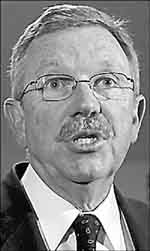Sunday, February 1
Truth catching up to Bush
HAROON SIDDIQUI, Toronto Star Editorial, January 29, 2004
Regardless of who emerges as the Democratic presidential nominee, the race has already served its greater democratic purpose: It has blown away George W. Bush's wartime aura of patriotic infallibility.
Not only Howard Dean, the passionate truth-teller about Iraq, but Senator John Kerry, Gen. Wesley Clark and others have found their voices to question almost all aspects of Bush's post-Sept. 11 performance.
They are bringing home to Americans the worldwide debates about their president's penchant for exploiting and fanning fears by exaggerating dangers, taking unilateral actions abroad, and squandering U.S. credibility.
"The U.S. is facing a crisis of international legitimacy," writes Robert Kagan, the respected analyst at the Carnegie Endowment for International Peace, in the upcoming spring issue of Foreign Affairs magazine.
Adds Serge Schmemann, editorial page editor of the Paris-based International Herald Tribune and a former writer for the New York Times: "I've been living in France for the past six months and I often wonder whether Americans are aware of the depth of the dread and revulsion in which Bush's United States is held by many foreigners."
But, thanks to the debates in the Democratic primaries and other developments, Americans are catching up.
Hardly a week goes by without new evidence of how Bush launched the war on Iraq on false pretences.

The latest source of embarrassment is America's own chief weapons hunter in Iraq.
David Kay has declared that:
--Iraq had no stockpiles of chemical or biological weapons.
--It did not, as claimed by Washington, ship out such weapons to Syria. It had none to ship.
--Iraq had no weapons programs to speak of after about 1995.
--Iraq did not get any nuclear cake from Niger.
--The mobile weapons lab that Dick Cheney and Colin Powell portrayed as death on wheels, were carriers of hydrogen for weather balloons.
These conclusions are the same as those of Scott Ritter, a member of the first United Nations weapons inspections team that was withdrawn in 1998. And of Hans Blix, head of the reconstituted U.N. inspections team. And of Mohamed ElBaradei, head of the International Atomic Energy Agency.
Kay made two more telling points, in interviews and at Congressional hearings yesterday.
The administration's exaggerations aside, the Central Intelligence Agency's intelligence gathering in Iraq was flawed, he said.
The CIA had infiltrated the U.N. Special Commission weapons inspection teams to spy on Iraqi weapons capabilities (just as Saddam Hussein had charged).
But "UNSCOM was like crack cocaine for the CIA," Kay told the New York Times. Once withdrawn, the CIA was adrift and missed a key development in Baghdad.
Saddam had lost touch with reality. He was approving every major decision himself. Scientists were running scams. They would present him with big schemes for weapons. He would grant huge sums of money. But not much would be done.
These were the same con artists, you will recall, whom Washington wanted interviewed by Blix and whisked out of Iraq so they could spill the beans on Saddam's secret weapons!
Despite Kay's devastating indictment, Bush and the boys are refusing to blink.
While no longer insisting, as they were until last week, that weapons would eventually be found, Bush, Cheney and others have slipped into their secondary argument: Saddam was evil and needed to be removed anyway.
But that was not their chosen tool to scare Americans into supporting their war. Rather, it was that Saddam could attack America with his deadly weapons, using missiles or terrorists.
To get around that blatant inconsistency, the White House is now trying a new tack: that Bush had never characterized Saddam's danger as "imminent," only as "grave and growing."
There is a difference?
The last time the White House tried such hair-splitting was when Bill Clinton argued it was not "sex" that he had had with Monica Lewinsky.
The difference in this case, of course, is that more than 500 Americans and nearly 15,000 Iraqi soldiers and civilians are dead.
As for the policy of toppling bad guys, of whom there are many, Human Rights Watch had something to say this week in a major report.
Humanitarian interventions, it said, are best reserved for stopping ongoing or imminent slaughters, as in Rwanda (where no one intervened in time) or in Iraq in 1988 when Saddam was gassing Kurds (and Washington winked). And such actions are best taken multilaterally.
The lone sheriff tableau is exclusively American — an outdated one at that, resurrected nonetheless in times of trouble for comforting reassurance. But if a Newsweek poll is any indication — Kerry leading Bush, 49 per cent to 46 per cent — the president may have overstayed his welcome in that role as well.

